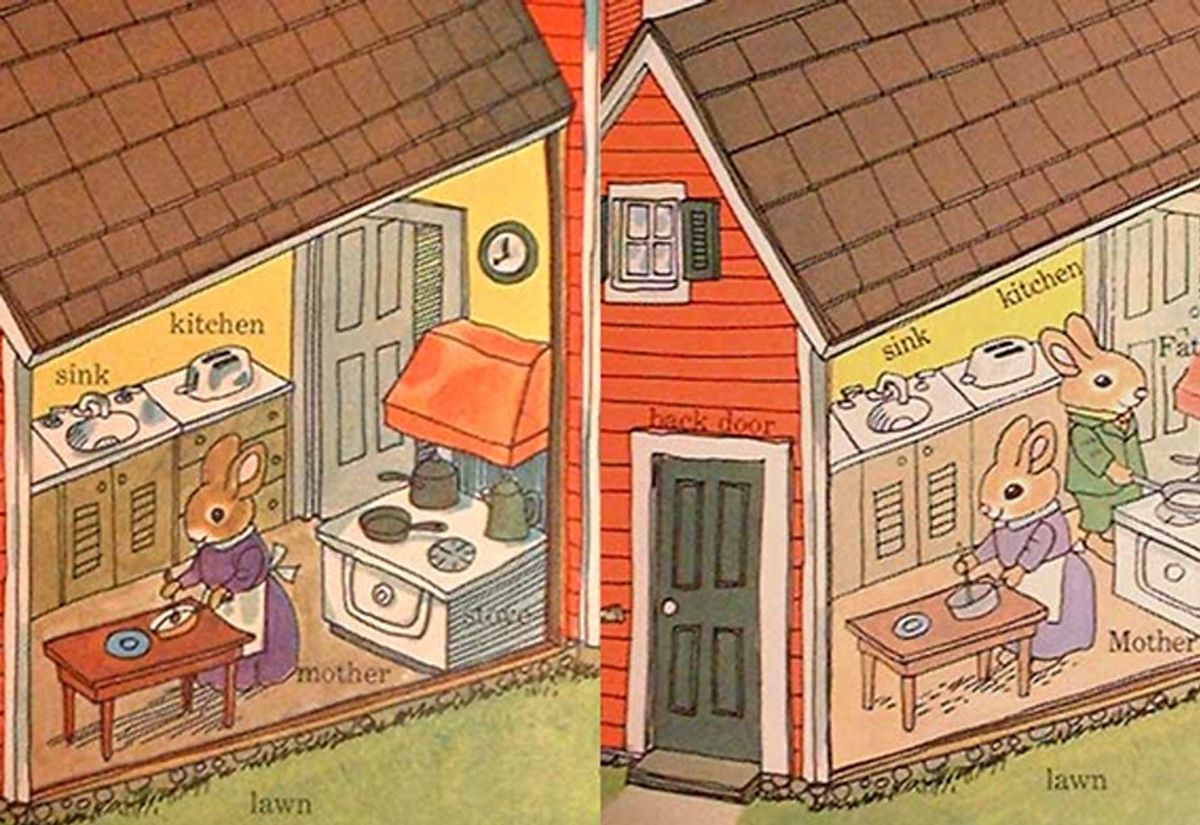8 changes that were made to a classic Richard Scarry book to keep up with the times. Progress!
All the misogyny and racism you may not have noticed are now gone.

Updating the kitchen.
Remember those beloved Richard Scarry books?
Books from when you were a kid?
Like a lot of people, I grew up reading them.
And now, I read them to my kids.

Richard Scarry’s Best Storybook Ever
Images via Alan Taylor/Flickr, used with permission.
If that doesn't ring a bell, perhaps this character from the "Busytown" series will. Classic!

Apple Car.
Images via Alan Taylor/Flickr, used with permission.
Scarry was an incredibly prolific children's author and illustrator. He created over 250 books during his career. His books were loved across the world — over 100 million were sold in many languages.
But here's something you may not have known about these classics: They've been slowly changing over the years.
Don't panic! They've been changing in a good way.
Scarry started publishing books in the 1950s, when times were, well, a little different. So some of the details were quietly updated.
Alan Taylor, a senior editor for the photo section of The Atlantic, noticed differences back in 2005 and decided to photograph them. From his Flickr album:
"The 1963 edition is my own, bought for me in the late 60's when I was a toddler, and read to tatters. The 1991 edition belongs to my kids today. I was so familiar with the older one that I immediately started noticing a few differences, and so have catalogued 14 of the more interesting differences here in this collection."
Taylor found 14 pages with differences between the original and updated versions.
Here are eight changes that reflect some of the progress society has made:
1. First up: The cover got a makeover. It might seem subtle at first glance, but look closely.

Richard Scarry’s Best Word Book Ever
Images via Alan Taylor/Flickr, used with permission.
The original has a woman (bunny) in the kitchen, while the updated cover has both a man and a woman (still bunnies) in the kitchen. Also: The "policeman" bear changed to a woman, and the label changed to "police officer." The word "mailman" became "letter carrier," and a female farmer was added. Oh, and we went from a cat-mom pushing the stroller to cat-dad! Progress!
(The bunny brushing its teeth in the house was changed from a boy to a girl, but I'm not gonna read into that because hopefully all bunny-kids brush their teeth, right? I mean, for the sake of their little bunny teefs!)
2. Men can be flight attendants and women can be pilots. And, you know, they don't have to be hot.

Pretty stewardess to flight attendant.
Images via Alan Taylor/Flickr, used with permission.
While the gender of each role remained the same in the newer version (which is, unfortunately, pretty legit, given the glaring lack of female pilots in real life), the stereotyping was eliminated by making the "handsome pilot" more of an everyday "pilot" (raccoon?) and by turning the "pretty stewardess" into a regular flight attendant.
3. Christmas isn't the only holiday people celebrate.

Adding the menorah.
Images via Alan Taylor/Flickr, used with permission.
Shhhh: Don't tell the Starbucks Christmas cup haters this, but there are a lot more winter holidays than just Christmas. The newer version of the book included a menorah in the blank space to recognize those who celebrate Hanukkah.
4. Mommy Bears are no longer expected to have breakfast prepared for Daddy Bears...

Dad bears being dad bears.
Images via Alan Taylor/Flickr, used with permission.
...and the subtle change from "called to breakfast" to "goes to the kitchen to eat his breakfast" reflects that.
(Side note: Do Daddy Bears realllllly want to be treated like Kid Bears by being called to a meal, where they must promptly appear? I'm thinking not.)
5. Because guess what?! Dads can cook, too! (Even Dad Bunnies.)

Dads can cook, too?
Images via Alan Taylor/Flickr, used with permission.
And Richard Scarry's book was updated to reflect the late-20th-century realization that everyone belongs in the kitchen!
6. Helping professions aren't just for men.

No more cowboys.
Images via Alan Taylor/Flickr, used with permission.
The updated version recognized that fact by changing "policeman" to "police officer" and "fireman" to "fire fighter." The ever-important job of cowboy was eliminated ( sigh ... how many career hopes and dreams were squashed?), replaced with a gardener and a scientist, both of which are filled by female characters. Three cheers for women in STEM! Also: The milkman was replaced by a taxi driver, but I'm pretty sure that was had to do with the fact that milkman (or woman) isn't a growing occupation any longer.
7. Regular people need rescuing, too.

Cat is in danger.
Images via Alan Taylor/Flickr, used with permission.
The newer version did away with the "beautiful screaming lady" (sigh... how many career hopes and dreams ... oh, wait — none) and replaced her with a regular "cat in danger." The "jumping gentleman" label was removed altogether, and the "fireman" became a "fire fighter" again.
8. "I" is for "ice cream" — and not stereotypical depictions of Native Americans.

Adding the cone.
Images via Alan Taylor/Flickr, used with permission.
We're still waiting for our football teams to get with the times, but the folks behind the Richard Scarry book update eliminated the "Indian" character that was wearing stereotypical clothing.
Yay, progress! And before you shrug and say "It's just a book," listen to this:
Florida State University recently led "the most comprehensive study of 20th century children's books ever undertaken in the United States." As you can surely guess, they found a gender bias toward male lead characters, even in books about animals — books like those by Richard Scarry.
Janice McCabe, the assistant professor of sociology who led the study, wrote:
"The widespread pattern of underrepresentation of females that we find supports the belief that female characters are less important and interesting than male characters. This may contribute to a sense of unimportance among girls and privilege among boys. The gender inequalities we found may be particularly powerful because they are reinforced by patterns of male-dominated characters in many other aspects of children's media, including cartoons, G-rated films, video games and even coloring books."
It's kind of cool to think these changes were made at least two and a half decades ago! That's something.
And we need changes to keep happening! Kids should be able to read books with same-sex couples and characters who have disabilities, for example, because those are everyday occurrences and books are a great intro to the world for kids.
Anyone else up for modernizing other classic kids' books so we can feel good about sharing them with our kids?
This article was writen by Laura Willard and originally appeared on 11.11.15
- 8 great coffee table books for last minute gifts - Upworthy ›
- Teacher's viral 'baggage activity' brought her students to tears - Upworthy ›
- What Maurice Sendak said when a kid ate one of his drawings - Upworthy ›
- Teacher explains why he 'doesn't like' 'Rainbow Fish' - Upworthy ›
- A thoughtful Dad created this innovative book to help his 5-year-old son cope with anxiety - Upworthy ›
- New dads explain why they still love the 'creepy, unhinged' children's book Love You Forever - Upworthy ›






